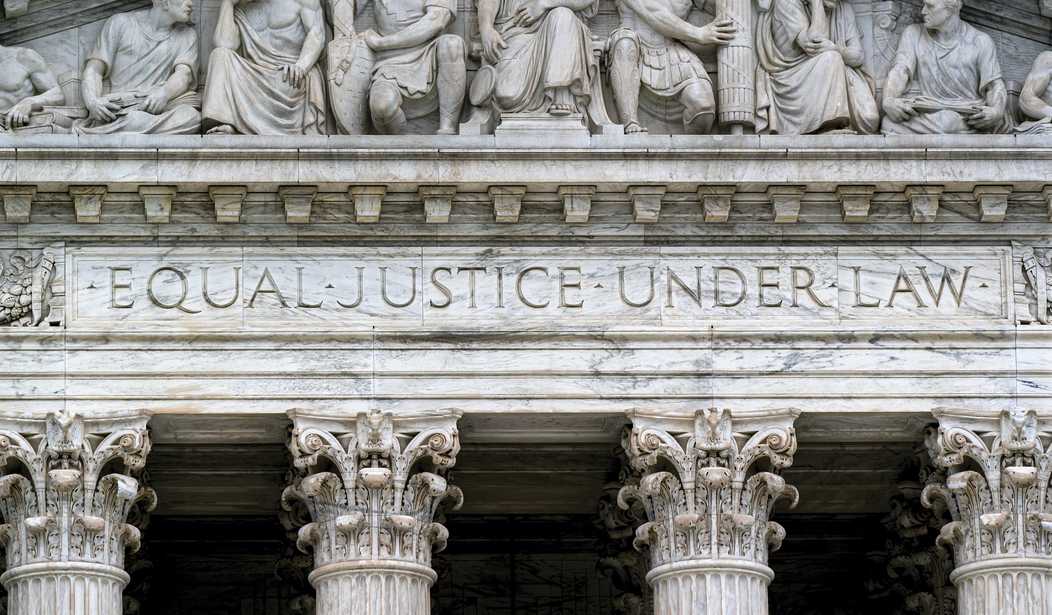Well, we made it. Monday marked the last day of Supreme Court decisions for the October 2023 Term and while one decision in particular had everyone waiting with bated breath, all three of the decisions handed down had some interesting twists to them. Two split 6-3 along party lines, and one was 9-0 (though with several concurrences). And two of the three also let the lower courts know they'd best roll up their sleeves and dig into the hard work of applying thorough analyses to varying fact patterns and complex issues before sending cases upstairs for an official SCOTUS ruling.
BREAKING: Supreme Court Rules on Presidential Immunity
SCOTUS Chastises Lower Courts in Online Speech Law Cases, Sends Them Back
How a North Dakota Truck Stop Brought the Federal Reserve
and the Administrative State to Heel
So, without further ado, Decisions No. 57, 58, and 59 of the 2023 term:
July 1, 2024 Decisions
Date: July 1, 2024
Author: Roberts
Split: 6-3
Dissent: Sotomayor, Kagan, Jackson
Appeal From: D.C. Circuit
Basic Facts:
A federal grand jury indicted former President Donald J. Trump on four counts for conduct that occurred during his Presidency following the November 2020 election. The indictment alleged that after losing that election, Trump conspired to overturn it by spreading knowingly false claims of election fraud to obstruct the collecting, counting, and certifying of the election results. Trump moved to dismiss the indictment based on Presidential immunity, arguing that a President has absolute immunity from criminal prosecution for actions performed within the outer perimeter of his official responsibilities, and that the indictment’s allegations fell within the core of his official duties. The District Court denied Trump’s motion to dismiss, holding that former Presidents do not possess federal criminal immunity for any acts. The D. C. Circuit affirmed. Both the District Court and the D. C. Circuit declined to decide whether the indicted conduct involved official acts.
Whether and if so to what extent does a former president enjoy presidential immunity from criminal prosecution for conduct alleged to involve official acts during his tenure in office.
Holding: Vacated and remanded.
Under our constitutional structure of separated powers, the nature of Presidential power entitles a former President to absolute immunity from criminal prosecution for actions within his conclusive and preclusive constitutional authority. And he is entitled to at least presumptive immunity from prosecution for all his official acts. There is no immunity for unofficial acts.
Skinny: Former presidents are neither immune from everything nor immune from nothing. For actions that fall exclusively within the power granted to the president by the Constitution there is absolute immunity. Beyond that, it comes down to what conduct falls under the heading of "official acts" and what does not, and the trial court needs to make that determination.
Note: The practical effect of this ruling is a win for former President Trump because it likely pushes this case past the election in November, though expect there to be a flurry of activity at the District Court level in the coming weeks. Legally, it also helps him that, per the ruling, the courts are not to consider his motives in determining what is and isn't "official conduct."
It will also be interesting to see the impact on and of Judge Cannon's rulings in the Florida case — particularly on the Jack Smith appointment issue.
See also:
Moody v. NetChoice, LLC (linked with NetChoice, LLC v. Paxton)
Date: July 1, 2024
Author: Kagan
Split: 9-0
Dissent: N/A
Appeal From: 11th Circuit, Fifth Circuit
Basic Facts:
In 2021, Florida and Texas enacted statutes regulating large social-media companies and other internet platforms. The States’ laws differ in the entities they cover and the activities they limit. But both curtail the platforms’ capacity to engage in content moderation—to filter, prioritize, and label the varied third-party messages, videos, and other content their users wish to post. Both laws also include individualized explanation provisions, requiring a platform to give reasons to a user if it removes or alters her posts.
NetChoice LLC and the Computer & Communications Industry Association (collectively, NetChoice)—trade associations whose members include Facebook and YouTube—brought facial First Amendment challenges against the two laws. District courts in both States entered preliminary injunctions.
The Eleventh Circuit upheld the injunction of Florida’s law, as to all provisions relevant here. The court held that the State’s restrictions on content moderation trigger First Amendment scrutiny under this Court’s cases protecting “editorial discretion.” 34 F. 4th 1196, 1209, 1216. The court then concluded that the content-moderation provisions are unlikely to survive heightened scrutiny. Id., at 1227–1228. Similarly, the Eleventh Circuit thought the statute’s individualized explanation requirements likely to fall. Relying on Zauderer v. Office of Disciplinary Counsel of Supreme Court of Ohio, 471 U. S. 626, the court held that the obligation to explain “millions of [decisions] per day” is “unduly burdensome and likely to chill platforms’ protected speech.” 34 F. 4th, at 1230.
The Fifth Circuit disagreed across the board, and so reversed the preliminary injunction of the Texas law. In that court’s view, the platforms’ content-moderation activities are “not speech” at all, and so do not implicate the First Amendment. 49 F. 4th 439, 466, 494. But even if those activities were expressive, the court determined the State could regulate them to advance its interest in “protecting a diversity of ideas.” Id., at 482. The court further held that the statute’s individualized-explanation provisions would likely survive, even assuming the platforms were engaged in speech. It found no undue burden under Zauderer because the platforms needed only to “scale up” a “complaint-and-appeal process” they already used. 49 F. 4th, at 487.
- Whether the laws’ content-moderation restrictions comply with the First Amendment
- Whether the laws’ individualized-explanation requirements comply with the First Amendment
Holding: Vacated and remanded.
The judgments are vacated, and the cases are remanded, because neither the Eleventh Circuit nor the Fifth Circuit conducted a proper analysis of the facial First Amendment challenges to Florida and Texas laws regulating large internet platforms.
Skinny:
The Fifth Circuit and Eleventh Circuit dropped the ball here. The Supremes would like them to think about it long and hard.
From a practical standpoint, the cases will likely both be back before the Supreme Court before too long.
Corner Post v. Board of Governors of the Federal Reserve System
Date: July 1, 2024
Author: Barrett
Split: 6-3
Dissent: Jackson, Sotomayor, Kagan
Appeal From: Eighth Circuit
Basic Facts:
Since it opened for business in 2018, petitioner Corner Post, like most merchants, has accepted debit cards as a form of payment. Debit card transactions require merchants to pay an “interchange fee” to the bank that issued the card. The fee amount is set by the payment networks (such as Visa and MasterCard) that process the transaction. In 2010 Congress tasked the Federal Reserve Board with making sure that interchange fees were “reasonable and proportional to the cost incurred by the issuer with respect to the transaction.” 15 U. S. C. §1693o–2(a)(3)(A). Discharging this duty, in 2011 the Board published Regulation II, which sets a maximum interchange fee of $0.21 per transaction plus .05% of the transaction’s value.
In 2021, Corner Post joined a suit brought against the Board under the Administrative Procedure Act (APA). The complaint challenged Regulation II on the ground that it allows higher interchange fees than the statute permits. The District Court dismissed the suit as time-barred under 28 U. S. C. §2401(a), the default six-year statute of limitations applicable to suits against the United States. The Eighth Circuit affirmed.
Does a plaintiffs APA claim "first accrue[]" under 28 U.S.C. §2401(a) when an agency issues a rule-regardless of whether that rule injures the plaintiff on that date (as the Eighth Circuit and five other circuits have held)-or when the rule first causes a plaintiff to "suffer[] legal wrong" or be "adversely affected or aggrieved" (as the Sixth Circuit has held)?
Holding: Reversed and remanded.
An APA claim does not accrue for purposes of §2401(a)’s 6-year statute of limitations until the plaintiff is injured by final agency action.
Skinny: You can't expect a plaintiff to bring a claim before (s)he is injured (or even exists).
You can check out prior installments of The Skinny on SCOTUS series, here.















Join the conversation as a VIP Member